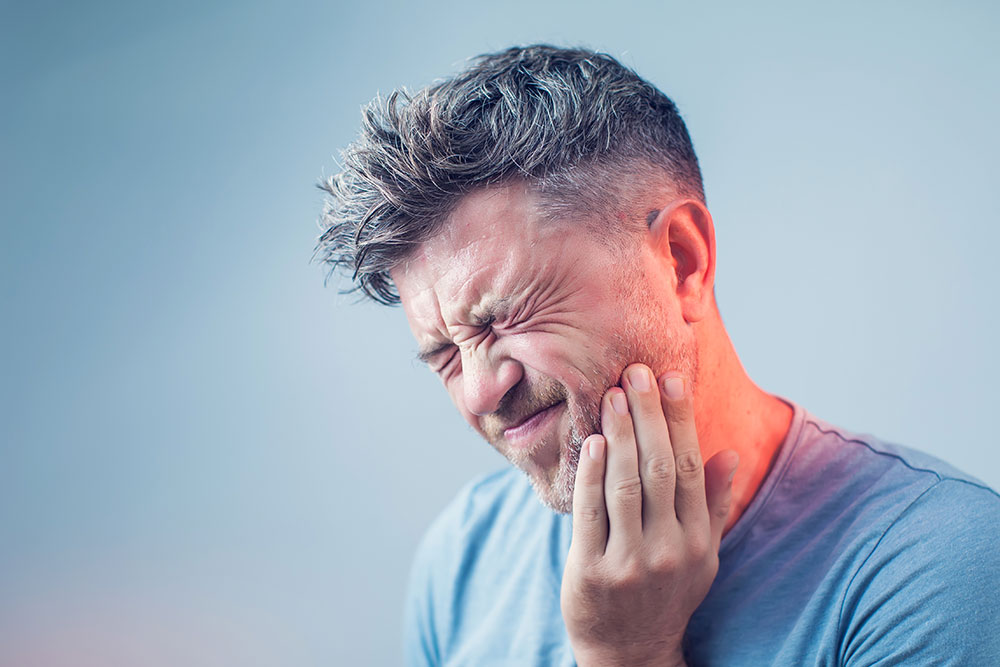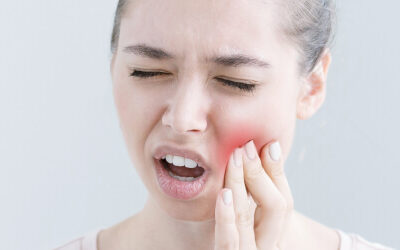If you’ve been dealing with sinus pressure and tooth pain at the same time, did you know they may be related?
A sinus infection can cause tooth pain, especially in the upper teeth.

How Sinus Pressure Can Affect the Nerves in the Teeth
Sinus infections begin in the maxillary sinuses. These are located on each side of your nose, right above the roots of your maxillary teeth.
When these maxillary sinuses get congested and experience a build-up of mucus, it can put pressure on dental nerve endings. This can lead to painful toothaches in one or more of the upper teeth.
Key Signs That Your Tooth Pain Might Be Sinus-Related
It can be tricky to determine if your tooth pain is sinus-related, but here are possible indications that your tooth pain is a result of sinus pressure or a sinus infection:
- The tooth pain may be accompanied by a headache
- The pain is in the upper teeth
- Often feels like painful pressure on the teeth rather than a sharp tooth pain
- You may also experience ear pain
- Doesn’t typically involve the tooth sensitivity seen with tooth pain from cavities
- Often includes nasal congestion on the same side you are experiencing the tooth pain
Easing Tooth Pain From Sinus Pressure
If your sinus pain and toothache is mild and it has been less than a week, you may be able to try these tips for relief. However, I recommend working in conjunction with your dentist or doctor to develop the proper treatment routine.
Here are tips for easing tooth pain from sinus pressure:
- Apply Warm Compresses – The first tip I give patients who are dealing with sinus pressure and pain is to use a warm compress. Simply soak a clean washcloth in warm water and gently drape it across your nose and cheekbones. Repeat this process several times throughout the day for about 10 minutes at a time. This can help ease pain, thin trapped mucus, promote increased blood flow to the area, and promote drainage to help relieve sinus pressure.
- Regularly Clean Your Nose – Try using a saltwater solution or store-bought nasal rinse to regularly clean inside your nose. Nasal irrigation can help reduce nasal discharge and clear your nose to decrease sinus pressure.
- Drink Enough Water – Dehydration can thicken mucus, causing blockages and the buildup of pressure in your sinuses. Drinking enough water can help thin mucus, promote drainage, and unblock sinuses. This can help reduce sinus pressure and tooth pain.
- Use Steam Inhalation – Steam is a wonderful, natural decongestant. Steam loosens and thins mucus to ease sinus pressure and inflammation. Steam inhalation can be as simple as taking a hot (but not overly hot) shower and breathing in deeply through your nose for 5 to 10 minutes.
- Prop Up Your Head – When lying down, make sure to prop your head up so it is tilted. This can help promote drainage and prevent sinus pressure from getting worse.
- Use a Humidifier – If the air in your home is dry, try using a humidifier. This can be especially helpful to use in a bedroom to help keep your sinuses moist as you sleep.
- Maintain Oral Hygiene – Sinus infections can contribute to dry mouth and put you at an increased risk of developing cavities and decay. Continue your oral hygiene routine by gently brushing your teeth with a soft-bristled toothbrush twice a day and flossing daily. I recommend a toothbrush with a smaller head so it is easy to maneuver in swollen or tender areas.
- Consider Expectorants or Decongestants – Ask your doctor or dentist about decongestants or expectorants for sinus-related tooth pain. Decongestants work by opening airways and reducing swelling of the nose blood vessels. Expectorants thin mucus to promote drainage and ease sinus pressure. Still, even if decongestants or expectorants relieve some of your sinus pressure, they do not fix the root cause. Persistent sinus issues or sinus-related tooth pain requires an evaluation by your doctor or dentist.
- Consider Pain Relief Options – Over-the counter pain relievers may help ease a sinus-related toothache. Check with your doctor for appropriate options.
When to See Your Dentist About Your Toothache
It is important to know when to contact your dentist regarding sinus pressure and a toothache.
If you notice these signs, seek professional help:
- A severe or persistent toothache
- A toothache that continues to get worse
- Severe sinus pressure that isn’t responding to treatment
- A fever that lasts longer than two days
- Ongoing symptoms lasting more than a week with no improvement
Sinus infections can have various causes, making it important to work with a healthcare professional to get to the root of the problem.
If your sinus infection is ongoing and caused by a viral or bacterial infection, your doctor may need to prescribe medication to treat it. Left untreated, sinus infections can worsen and cause the tooth pain to spread.
Seasonal Changes and Their Impact on Sinus Health
Many people notice their sinus pain gets worse depending on the season. A variety of seasonal factors affect how your sinuses function and how much sinus pressure you experience.
Several seasonal changes can have an impact on sinus health, including:
- Humidity – Humidity changes can make seasonal allergies worse, leading to increased nasal congestion and sinus pressure.
- Allergens – Seasonal changes cause fluctuating levels of pollen and allergens. These allergens can trigger an immune response, leading to swelling and pressure in the sinus cavity.
- Temperature – Sudden temperature transitions can trigger sinus pressure and nasal congestion. This can lead to increased sinus pressure that can contribute to tooth pain during seasonal transitions.
- Air Pressure – Air pressure shifts can occur during seasonal transitions and make sinus pain worse. This can worsen congestion and sinus pressure, leading to possible sinus-related toothaches.
Dealing With Sinus Pressure and Tooth Pain? Our Caring Team at 123 Dental Is Here to Help
If you are dealing with sinus pressure and tooth pain and are wondering if they are related, we are here to help. We can evaluate your mouth and tooth pain and determine if a sinus infection is causing your toothache.
Book your consultation and we’ll get to the bottom of the issue and create a personalised plan to get you feeling better as soon as possible.
We encourage you to schedule regular dental checkups to keep your mouth and teeth as healthy as possible and keep an eye on any sinus-related tooth pain you are experiencing.






